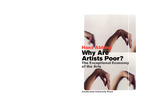Why Are Artists Poor?
The Exceptional Economy of the Arts
Abstract
Most artists earn very little. Nevertheless, there is no shortage of aspiring young artists. Do they give to the arts willingly or unknowingly? Governments and other institutions also give to the arts, to raise the low incomes. But their support is ineffective: subsidies only increase the artists' poverty. The economy of the arts is exceptional. Although the arts operate successfully in the marketplace, their natural affinity is with gift-giving, rather than with commercial exchange. People believe that artists are selflessly dedicated to art, that price does not reflect quality, and that the arts are free. But is it true? This unconventional multidisciplinary analysis explains the exceptional economy of the arts. Insightful illustrations from the practice of a visual artist support the analysis. Kunstenaars verdienen vaak weinig. Toch is er aan jonge kunstenaars geen gebrek! Nemen zij het beperkte financiële gewin voor lief of weten zij niet beter? De overheid levert een bijdrage om de lage inkomens te compenseren, maar door subsidies lijkt de armoede onder kunstenaars slechts toe te nemen. In deze onconventionele en multidisciplinaire studie analyseert fotograaf, schilder en econoom Hans Abbing de uitzonderlijke economie van de kunsten: wijden kunstenaars zich geheel belangenloos aan hun werk, of laten zij zich wel degelijk leiden door economische motieven.
Keywords
culture and instituten; economics; kunst en kunstgeschiedenis; economie; culture and institutions; historical treatment of fine and decorative artsDOI
10.5117/9789053565650ISBN
9789053565650OCN
630532278Publisher
Amsterdam University PressPublisher website
https://www.aup.nl/Publication date and place
2008Classification
Art: financial aspects
History of art
Society and culture: general
Economics, Finance, Business and Management


 Download
Download